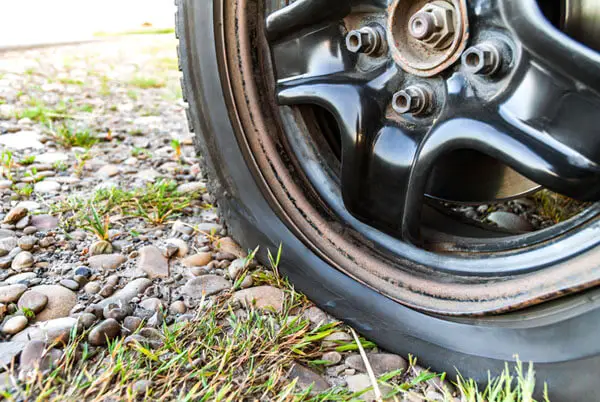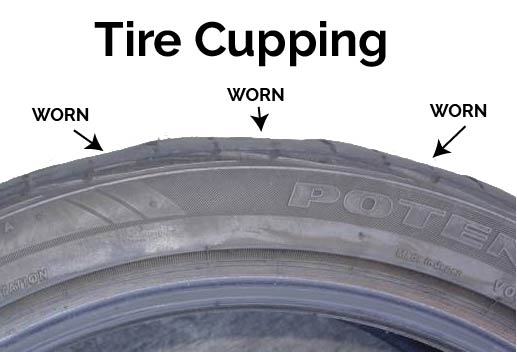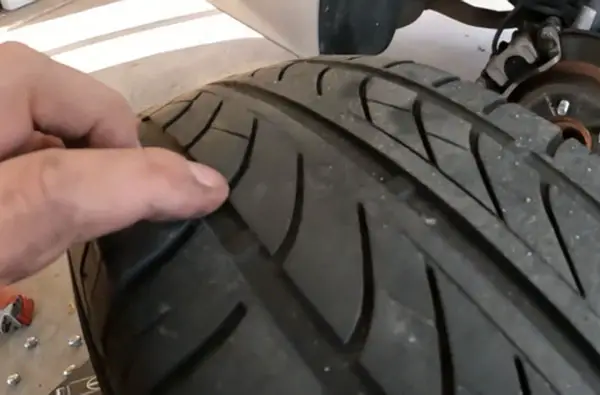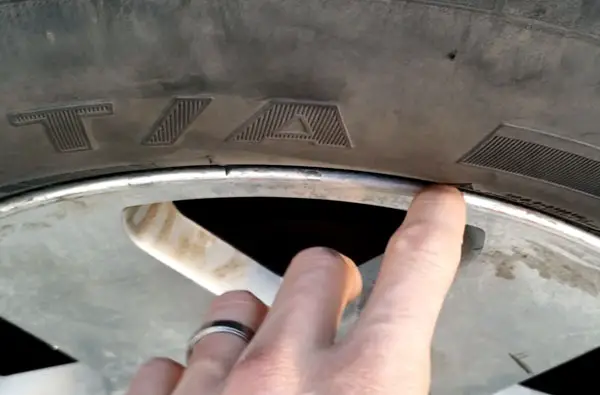Are you experiencing your car shaking lately? A lot of thoughts must be knocking in your mind thinking about the matter now. In some cases, the thought begs: can a bad tire make your car shake?
Actually, yes, a bad tire can make your car shake. When the tires are worn out or lose treads, it causes the car to shake. Anything that rotates (transmissions, brakes, or drive-line) can cause shaking in the vehicle, so, of course, the tires can.
Wait, wait! That is not all to know! In today’s write-up, we will cover all the relatable things about the car shaking caused by the tires. So as not to get bothered by any more searching, stay tuned with us till the end.
Are My Tires Causing My Car to Shake?
It is nothing new to say that tires play the most crucial or significant role in the vehicle, no matter whether the vehicle is two or four wheels. These are the tires that make the car run smoothly on the road.
So, of course, when the tires are bearing any issue, there will be significant changes in the vehicle that you may notice, like shaking.
Over time when the tire has become flat or has cupping on it, the car starts bouncing on the road while you are on a drive.
Besides, when the tire is out of balance, it can shake the car. In general, the shaking starts at 50 to 55 mph or miles per hour, worsens at 60 mph & the vibration gets better at higher speeds.
Apart from these, there is also a possibility that the tire of your car has low pressure or the tire has become loosened by any chance causing the car to shake.
Uneven tire wear or the separated tread is also a countable cause for the car’s shaking caused by the tires.
How Do You Know If a Tire is Defective? [Signs & Symptoms]

When you are experiencing your car shaking while driving, there is a high chance that your car’s tires are defective.
Most drivers mistakenly assume that their vehicles’ tires are in good condition until they are not flat.
But some obvious signs indicate tire damage. Take a quick look at the signs & symptoms of a bad tire in your vehicle.
- Uneven tire wire
- Noise when driving
- Cracks or bulges
- More frequent air pressure problems
- Excessive vibrations
- Bubbles or blisters
Diagnosing the Tire Problems Causing Shaking?
Tires are very consistent in the vehicle so that it will shake or wobble at the same speed every time, sometimes at different speeds.
So, if your car is shaking at the same or on acceleration, then the tires are the first thing you need to check.
Follow up on the below steps to see whether the tire of your car is bearing any of these.
#1 – Check for Tire Pressure & Fitness
When your car is shaking, first check whether the tire has the proper pressure that it should be. You can also check the user manual to check, though. Besides, ensure the lug nuts of your vehicle’s tire are properly torqued.
#2 – Check for Cupping

To test for cupping on the tire, simply run your hand on the tire’s surface to feel it. If you think the tire is flat, then the tire is good. In case the tire feels like small waves like seas when you touch it, then the tire has cupping.
Cupping is actually caused by misalignment. If the misalignment shows on the rear of your front-wheel drive car, you have to get the four-wheel alignment done.
#3 – Check for Flat Spots

As the flat spot is caused by locking the brakes, if you’ve locked the brake and slid a long way, then you indeed have flat spots on the tires.
To test it again, simply run your hand or visually inspect the surface while spinning it.
If you notice an area where the tire is shaved off instead of its round profile, it has flat spots requiring a replacement. Now replace the tires.
#4 – Car Shaking at Different Speeds
If your car has passed the tests mentioned above, you can tell what problem the tire your vehicle has by the speed at which the car shakes. Let’s take a look.
- Shakes at 15-20 mph or miles per hour [Separated thread]
If you notice your car shaking at 15-20 mph, immediately go to the tire shop without any second thought.
Although car shaking can be caused by severe cupping or bent wheels, it is mostly caused by tread separation at this speed.
The separated tread has a severe safety issue, so the situation needs an immediate check-up by the experts.
- Shakes at 30-50 mph or miles per hour [Out-of-round tire]
Car shaking at this speed range is caused by the bent wheel or a slightly out-of-round tire. You can see the wobble on the tire assembly if you put it on the balancer.
Matching the tires with the wheel would be best to eliminate the wobbles. Otherwise, the tire needs to be replaced.
- Shakes at 50 mph or higher [Improper tire balance]
Shaking of a car at this speed range is caused mainly by improper tire balance. So, you should check first whether the tires are balanced correctly.
#5 – Check for Bent Rim

If your car bangs into a curb too hard or drives fast in a road hazard like potholes, you might have a bent rim in your vehicle. Often it can be challenging to diagnose the bent rim by yourself.
So, if your car is shaking and there is no visual sign of tire damage, get your vehicle checked by the experts.
How Much Will It Cost to Replace the Bad Tires?
The price to replace the tire varies dramatically depending on the car that you drive.
The tire replacement cost to replace the tire in a single standard tire is between $50-$200 based on the brands and models of the car.
The tire replacement price is about $350 when driving SUVs, large trucks, or pick-ups. A cursory search gives an idea of the tire replacement range.
Note: These are approximate replacement cost ranges of each tire & estimated only for the tire itself, not including the installation.
| Models | Tire Replacement Price |
|---|---|
| Ford F150 | $142-$211 |
| Mazda 3 | $69-$161 |
| Honda CR-V | $149-$302 |
| Chevy Colorado | $91-$150 |
| Acura RDX | $145-$250 |
Can I Continue Driving with A Bad Tire?
Technically, it would be best if you did not continue driving with a bad tire in your vehicle.
It will be dangerous & can bring up unwanted damages if you go with bald, worn-out, or low-tread tires, and it can even cause more in the long run.
Like-
- When the roads are wet, you cannot brake the car promptly and efficiently, increasing the potentiality of an accident.
- There will be an increased risk of hydroplaning & handling worsening.
- A bad tire cannot gain traction on an icy or snow-covered road. Besides, heat can build up in your vehicle dangerously if you continue driving with a bad tire.
- Low treads are at greater risk of having punctures, which may lead to sudden blowouts.
- Bad tires prompt air pressure loss, affecting braking, fuel economy, and steering.
Conclusion
Believe it or not, the tires are the most common thing to make the car shake in most cases. So, whenever you notice the car shaking or shimming while you are on the road, never ignore it.
Have your vehicle serviced by the mechanics or the professionals nearby. Actually, tires and wheels are not the only causes that can make the vehicle shake; still, the tire conditions are an excellent point to start with.
In fact, you can prevent the shaking of your car altogether just by taking some small preventative steps, as well as a lot of unwanted issues, & can avoid a potential accident. So, schedule your maintenance & be safe on the road rather than being sorry!
FAQs
Down below, we will cover some frequently searched queries that may pop up in your mind after reading the whole discussion. Let us take a quick look for a better idea.
Yes, bad tires can affect the steering. When the tires get damaged in your car or the tires with worn treads cause to leak air or to lose air pressure. It can affect the brake & fuel economy as well as affect steering.
Actually, large tires can cause the slow acceleration of your car. When you use a tire larger than your vehicle’s actual need, due to the large contact patch & and additional weight, you can experience slow acceleration in the car.
Tire troubles can cause rough rides in the vehicle. When the tires get damaged or have any issues, you can face rough rides instead of smooth rides.
The tires can make the car shake at high speeds. Tires are crucial for smooth acceleration on the road. If the tires go bad or worn out, the vehicle can start shaking while driving at high speeds or while accelerating.
If your car shakes after having the new tires, it is possible that the tires are not installed perfectly. In any case, if the tires or wheels do not hit the mark on balancing, the car will shake even with new tires.
